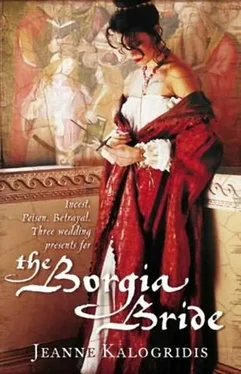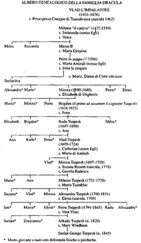Now, Alexander informed his daughter, she would become the Duchess of Gravina. Politically, this was the wisest course of action.
No, Lucrezia had told her father. She would have nothing to do with the man.
Startled, Alexander had asked her reason.
‘Because all my husbands have been very unlucky!’ Lucrezia announced angrily, and stormed from the chamber without asking His Holiness’ leave.
Word of this spread quickly throughout Rome. When the Duke of Gravina heard of her refusal, he took great offence (or perhaps he considered the truth of Lucrezia’s words), and withdrew his offer at once.
Shortly thereafter, I found myself restless one evening, and took to wandering the corridors. Winter was approaching, and I kept my cape wrapped tightly about me as I headed for the loggia, to take in the bracing night air.
Even before I stepped from the landing onto the floor, I could hear the bells of Saint Peter’s, singing a funeral dirge.
Staring out over the balcony’s edge, pale as the fur she was wrapped in, stood a small, slender woman wrapped in white ermine, accompanied by guards who waited at a respectful distance. I was so distracted by the bells, I was almost upon her before I noticed her.
She was one of the most beautiful creatures I had ever seen, more beautiful even than the Pope’s former mistress, the delicate Giulia. This woman was alabaster-skinned, golden-haired, with blue eyes brighter than any gem; in her bearing was a rare dignity and grace, and in her gaze was a profound sadness. I understood at once why Cesare had wanted to possess her.
‘Caterina Sforza,’ I breathed.
She turned her striking features toward me and regarded me. There was no hostility in her gaze, no condescension, only a grief that verged on madness.
She moved slightly aside, making room at the balcony. It was a clear invitation and I took it, stepping up to stand beside her.
She was silent some time, gazing out again at the piazza in front of the great stone edifice of Saint Peter’s, where a torch-lit funeral procession was slowly making its way out of the cathedral and into the street. From the number of mourners, I judged the deceased to be a person of some importance.
At last Donna Caterina sighed. ‘Another cardinal, no doubt,’ she said, in a voice stronger and more resonant than I would have expected, ‘cut down in order to finance Cesare’s wars.’ She paused. ‘Each time I hear the bells toll, I pray they are for the Holy Father.’
‘I pray they are for Cesare,’ I countered. ‘He is a far worthier candidate for death.’
She looked at me, tilting her lovely head and appraising me frankly. ‘It is better if Alexander dies first, you see,’ she explained. ‘For if his son predeceases him, he will simply find another Cesare to head his army, and continue the Borgia terror. It is a game they play together: the Pope merely pretends not to be able to control Cesare’s cruelty, but believe me, each hand knows exactly what the other is doing at all times. Of course, if Alexander were to die…’ She leaned toward me and lowered her voice conspiratorially. ‘Surely I told you what the Venetian ambassador said to me, long ago, about Cesare.’
I smiled politely. ‘We have never spoken, Madonna.’ I could not fault her for her confusion; I was not in full possession of my senses myself.
She seemed not to hear my words. ‘It was some time ago, before he murdered Lucrezia’s last husband. Cesare was busy testing the waters, playing Spain against France, and France against Spain, waiting to see which alliance would prove the most advantageous.’ She laughed softly. ‘He was so inconstant…He actually went to the Venetian ambassador at one point and swore allegiance to Venice. He said that he trusted neither France nor Spain to protect him should anything happen to the Holy Father. And the ambassador told him, most frankly, ‘You would certainly need help, it is true; for if anything ever happened to His Holiness, your affairs would not last three days.’ She laughed again, and directed her attention once more to the torches moving silently through the dark streets of Rome.
I followed her gaze and contemplated the tiny travelling flames, the small black shapes of the grieving that faded into the surrounding night. Born of madness or not, my brother’s ghost had spoken the truth: I had tried to kill the wrong man.
For the first time since coming to the Castel Sant’Angelo, I considered the canterella in my possession not as a means of self-destruction, but as a solution to the problems facing all of Italy. I returned to my rooms and sat brooding for hours. I possessed the weapon, but not sufficient knowledge of its use; nor did I have the means to deliver it to its target. I was watched at all times: I could scarcely walk into the Vatican and offer His Holiness a cup of wine. Esmeralda, too, was closely guarded; she no longer possessed the freedom to contact an assassin.
‘I am ready,’ I whispered to the strega in the darkness. ‘But if I am to fulfil my destiny, you must send help. I cannot accomplish this alone.’
The next day at dusk, as I sat in my antechamber with Donna Esmeralda waiting for supper to be delivered, the doors were thrown open without the usual courteous knock. We turned; the two guards flanking the entrance bowed low as first Donna Maria, then Lucrezia herself, entered.
Donna Esmeralda rose and stared balefully at the two women, her arms folded across her chest in silent disapproval of our visitors.
I said nothing, but stood and studied Lucrezia. She was clad in blue-green silk skirts, with a matching velvet bodice and sleeves; her neck sparkled with emeralds, and diamonds dotted the gold netting covering her hair. She was dressed grandly, in the Roman style, while I had gone back to wearing unadorned Neapolitan black.
But all her finery could not hide her pallor, or put the spark of life back into her haggard, hollow eyes. Sorrow had worn her; any prettiness she ever possessed had fled.
At the sight of me, she gave a small, tentative smile and spread her arms.
I offered no welcome. I stared steadily at her, my arms at my sides, and watched her smile fade to an expression of veiled hurt and guilt.
‘Why have you come?’ I asked. There was no rancour in my tone, only bluntness.
She motioned for Donna Esmeralda and Donna Maria to step outside into the corridor; after they complied, she ordered the guards to close the doors, giving us privacy.
Once assured our words had no witnesses, she answered, ‘I was in Rome.’ Her voice was soft, tinged with shame. ‘But I shall not remain here long. I had to see for myself how you were faring. I have been worried; I heard you were unwell.’
‘It is all true, what they have said,’ I told her flatly. ‘I quite lost my mind. But it returns to me now and again.’
‘And it is all true, what they have said about me,’ she replied, with a trace of irony. ‘I am obliged to marry again.’
I had no reply for such a statement-not when Alfonso’s ghost hovered between us, a silent rebuke.
Lucrezia’s gaze was fixed not on me, but down and away, on a distant spot in the past, as though her explanation were an apology to my brother, not to me. Her face grew taut with loathing and self-disgust. ‘I refused at first-but I am far too valuable a political commodity to have my own way. My father and Cesare…I need not tell you what pressure they brought to bear on me.’ A slight flush coloured her cheeks, as an unspoken memory provoked her anger; she gathered herself, and finally looked directly at me.
‘But I convinced them to let me make the choice, leaving them with final approval. They agreed. I have made it, and they have approved.’ She drew a breath. ‘I chose a D’Este of Ferrara.’
Читать дальше
Конец ознакомительного отрывка
Купить книгу












